So if unemployment benefits are a lot harder to get than last time around, what does this mean for the macro economy? 1. The weekly new claims number doesn’t correlate to the ‘labor market’ the way it did in prior cycles. 2. Federal spending on unemployment benefits increases less rapidly as the economy deteriorates. 3. New claims fall faster than employment as a % of the population increases. 4. There is that much more downward pressure on wages. 5. More jobs come from people who are reported to be outside of the labor force. 6. Productivity falls as those who would have collected benefits become employed in services that don’t increase reported GDP. 7. Tax receipts remain elevated as people are working who otherwise would be collecting benefits That is, if automatic fiscal stabilizers are deactivated, the slowdown (from ‘unspent income’, etc.) is prolonged and disguised? Yes, unemployment is down, but only because the labor force participation rate is down. Yes, most new hires were considered ‘outside the labor force’ immediately before getting jobs. If these people, who actually did take jobs, had been considered ‘available for work’ the day before they were hired, they would have been considered ‘unemployed’ and the unemployment rate would have been that much higher. The reported numbers aren’t ‘wrong’, but the question is what they are actually reporting.
Topics:
WARREN MOSLER considers the following as important: Uncategorized
This could be interesting, too:
tom writes The Ukraine war and Europe’s deepening march of folly
Stavros Mavroudeas writes CfP of Marxist Macroeconomic Modelling workgroup – 18th WAPE Forum, Istanbul August 6-8, 2025
Lars Pålsson Syll writes The pretence-of-knowledge syndrome
Dean Baker writes Crypto and Donald Trump’s strategic baseball card reserve
So if unemployment benefits are a lot harder to get than last time around, what does this mean for the macro economy?
1. The weekly new claims number doesn’t correlate to the ‘labor market’ the way it did in prior cycles.
2. Federal spending on unemployment benefits increases less rapidly as the economy deteriorates.
3. New claims fall faster than employment as a % of the population increases.
4. There is that much more downward pressure on wages.
5. More jobs come from people who are reported to be outside of the labor force.
6. Productivity falls as those who would have collected benefits become employed in services that don’t increase reported GDP.
7. Tax receipts remain elevated as people are working who otherwise would be collecting benefits
That is, if automatic fiscal stabilizers are deactivated, the slowdown (from ‘unspent income’, etc.) is prolonged and disguised?
Yes, unemployment is down, but only because the labor force participation rate is down. Yes, most new hires were considered ‘outside the labor force’ immediately before getting jobs. If these people, who actually did take jobs, had been considered ‘available for work’ the day before they were hired, they would have been considered ‘unemployed’ and the unemployment rate would have been that much higher. The reported numbers aren’t ‘wrong’, but the question is what they are actually reporting.
The actual number of claims is near or below past cycles, even with a growing population.
Something has changed!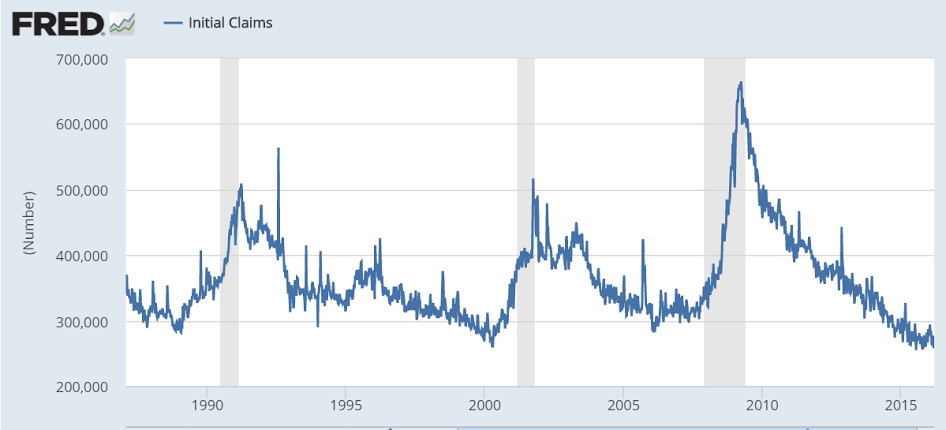
Does it make sense that that many people dropped out of the labor force all at once?
For ‘demographic’ reasons? Or is it just the very bad economy?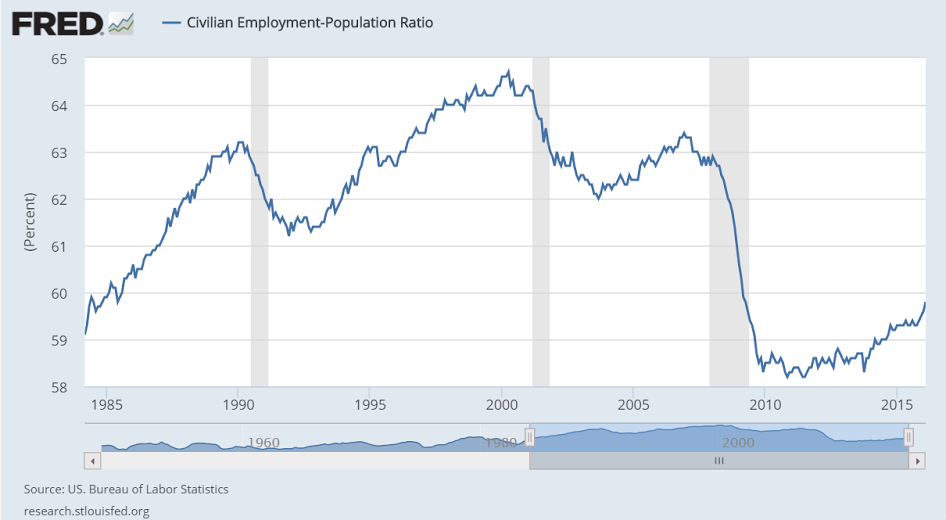
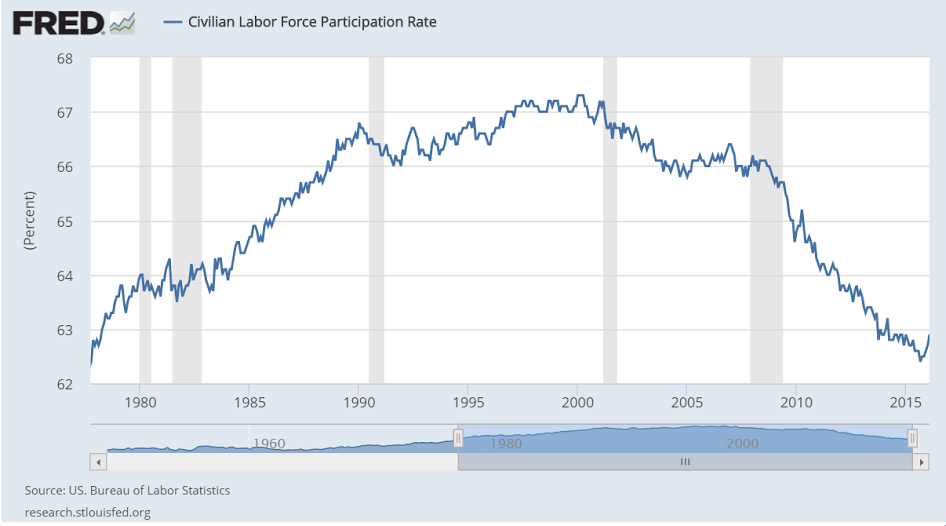
And why did this age group suddenly ‘drop out of the labor force’?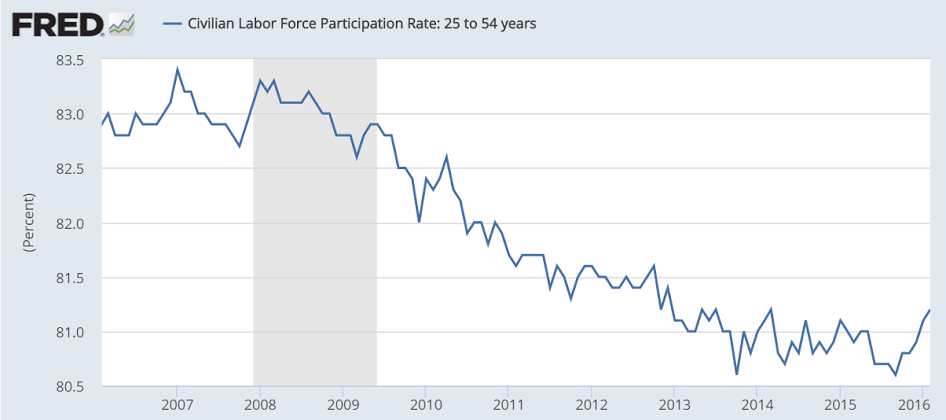
This measure of unemployment is based on a broader measure of the labor force, though it still excludes substantial numbers of people who are getting the new jobs.
And while it has come down, it remains above or near the highs of prior cycles, indicating a still very large output gap.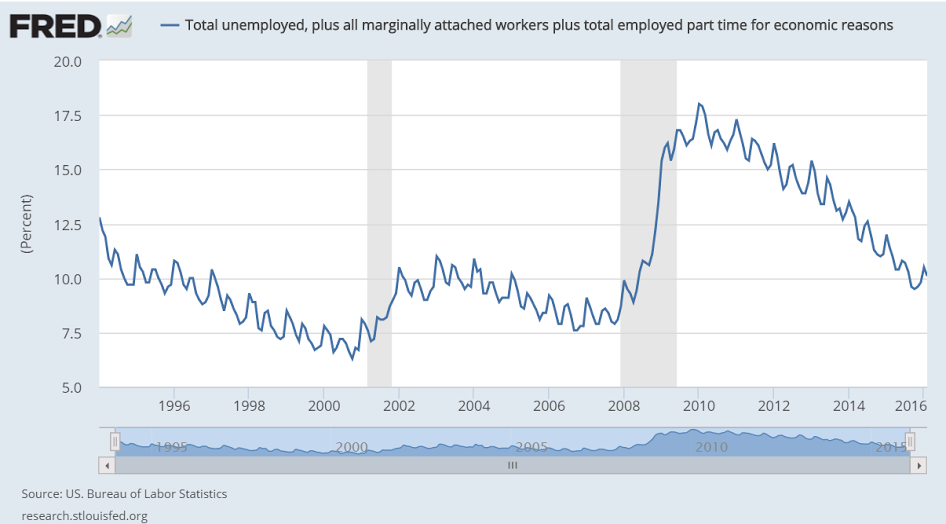
Hence masses of Democrats are not buying Clinton’s touting of Obama’s economic record, but instead are ‘feeling the Bern’? And Republicans responding to Trump’s message about who’s ‘taking their jobs’, as both Trump and Sanders message of protectionism is resonating?
Comments welcome!
